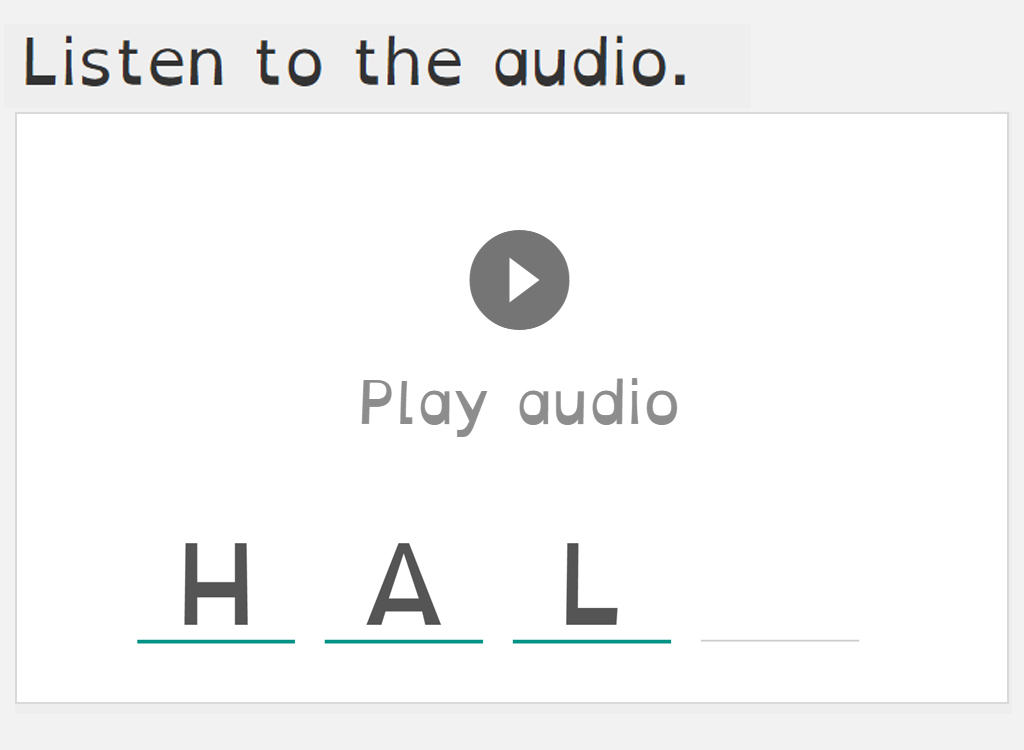Complete the Word
Some children have difficulty in spelling. Reading and writing come to us naturally and we don’t realize how complex these activities are. Several skills are required to master spelling. Two skills that come into play while we read and write are:
- Hearing the sounds in words or auditory processing. To spell well, we have to isolate the sounds in words and match these sounds to letters. The final step is to blend these sounds to write the words. Some children find it difficult to process the sounds in words though they have no hearing loss. Making sense of vowels poses problems for them. To know more go to Auditory Processing Disorder in the Homepage of this site.
- Visual processing. Another skill required to read and write is visual processing. Deficits in this area cause errors in spelling.Some children, though possessing normal eyesight, are unable to process what they see. They have difficulty in understanding the order of letters in a word and they are often inconsistent in spelling words. They may spell the same word differently. They confuse similar looking letters such as b and d or p and q.
The aim of this activity is to provide visual and auditory inputs for better spelling. In this activity, words are shown with one or more than one letter missing. The words are read out. The challenge is to find the missing letter or letters to complete the word.
How is the activity organised?
There are three levels in this activity. The table below gives the details of the levels:
|
Level |
length of words |
How many letters are missing? |
|
one |
four or five letters |
one |
|
two |
six or seven letters |
two |
|
three |
seven to nine letters |
three |
The 26 letters in English make 44 sounds (phonemes) and in this activity all these sounds are included. Two hundred and forty words are included here. Some children have problems in spelling blends- sn, sc, br etc. They don’t see these as a single unit and they insert vowels- sac, bur etc instead of writing the blends sc or br.A good collection of words having blends are used in this activity. Another problem faced by children is the use of vowels. To help these children, there are many questions where vowels are missing.
Proper remedial actions are required to help a child who struggles to spell. Writing a word many times is not always helpful in learning to spell. Parents should become aware of the specific difficulties of their child. This activity helps the parents to know whether their child is able to match sounds to letters. They can also know which types of words cause more difficulty for their child.
Tips for you, the parents:
How to take this activity forward at home?
- Improve the memory of your child.Do this activity daily but don’t spend too much time on it. Learn the spelling of only ten or fifteen words in a sitting. Immediately after completion of this activity, ask your child to recall and write the words she/he has learnt. This would improve your child’s memory. Ask your child to revise spelling of these words after few hours. Give dictation of these words. Frequent revision is needed.
While teaching spelling to your child, teach the meaning of the words and make sentences with them. Writing fifteen sentences daily is an excellent activity to improve language skills. Ask your child to make sentences with these words.
- Make permanent worksheets.
How to make permanent worksheets? In a notebook, make nine boxes in a page. Then take another page and make 9 similar boxes. Number the boxes 1 to 9. On one page write words (incomplete) with one, two or three letters missing. On the other page, write the same words (completed). Note both the incomplete word and the completed words would have the same number. This is to easily identify the words. A page of the incomplete words and a page of the completed words are shown below.
Incomplete words Page one – to be used by the child
|
1 wor_d |
2 sh_rp |
3 bra_n |
|
4 tra_el |
5 c_me_t |
6 _osp_ta_ |
|
7 fl_sh |
8 s_ri_g |
9 b_cau_e |
Completed words Page one – for the reference of the parent
|
1 world |
2 sharp |
3 brain |
|
4 travel |
5 cement |
6 hospital |
|
7 flesh |
8 spring |
9 because |
How to use the lists? Let us assume you want to teach the spelling of brain to your child. Keep the list of complete words with you and give the list of incomplete versions of the words to your child. Read out the word brain (number 1) from your list and direct your child to refer to number 1 and ask her/him to complete the word.
If your child is not able to spell a word correctly, ask her/him to say the word slowly several times stretching the sound of the letters in the word. You can also read the word aloud slowly. If your child struggles to spell, frequent revision is required.
Preparing a permanent record of words is time consuming. But it is worth attempting as your child is likely to benefit enormously.
Spelling Success Level 1, level 2, Level 3,level 4 and Level 5 by Peter Clutterbuck are good books to have. You can buy these online if your local bookshops don’t have them.

